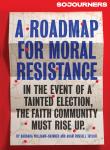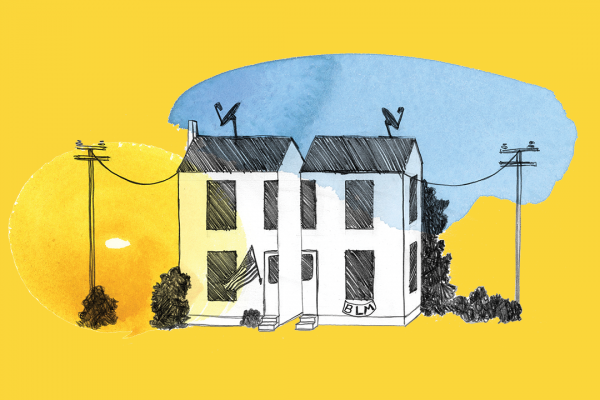RETIREES RICHARD AND LISA Starling are Georgia natives turned Cornell academics; their son Michael and his wife, Diane, are barely getting by in Texas; their son Thad and his boyfriend, Jake, live comfortably in Brooklyn. These family members voted for different candidates. Their experiences of religion range from solace to trauma, they have an unwritten list of topics they don’t discuss, and it takes tragedy and close confines to break open their surface-level peace and push them into the conversations they’ve been avoiding.
These characters appear in David James Poissant’s latest novel Lake Life, which is set in 2018 but explores family dynamics that feel especially relevant in 2020. Jen Hinst-White spoke with Poissant in late July, five months into COVID-19 social distancing, two months after George Floyd’s death and the resulting groundswell of protest, and three months before the national election.
Jen Hinst-White: You could have written a straightforward family drama, but your characters’ personal struggles also pull in big questions of theology, culture, and politics. Why?
David James Poissant: Those things grew important to me in my writing life because they’re important to me in my real life. I’m bad at acquaintanceships. As soon as I meet someone, I want to talk to them about God and their childhood and “Do you go to therapy?” I can’t write about family without writing about place, and I can’t help considering the politics and environment of the places I’m writing. Do these people believe in God, and in what way? And how do their beliefs affect their worldview? In an alternate universe, I’m probably a sociologist.
In one scene, a family dinner fractures into a bitter argument. I don’t get the sense that you share all your characters’ worldviews—Michael, for example—but you gave him several paragraphs to explain himself on his own terms. Why?
In August Wilson’s play Radio Golf, he gives arguably the best monologue to a character who argues that gentrification is a necessary evil and that economics trump community. In an interview, Wilson said it was important that he make that argument as strongly as he could and not make the man a caricature, so that we all see what we’re up against. In Lake Life, I did not want to make the novel’s lone Republican and fiscal conservative look like an uninformed idiot. I had to cite facts, including those that upset me, like the fact that a president who won the Nobel Peace Prize oversaw so many drone strike killings. We on the Left aren’t perfect, or even close. Being an American means being enmeshed in a complicated machinery that brings suffering to others. I didn’t want to demonize Michael simply for his political party, because, in reality, there’s no universal Republican or Democrat. Michael, for instance, has no problem with his brother’s sexuality, just as plenty of conservatives wouldn’t. When painting with a broad brush, many liberals assume all conservatives take an anti-LGBT+ stance, but that’s just not the case, and I wanted to see that complication and nuance reflected in my characters.
Michael keeps bringing up Trump, and his mother Lisa snaps, “We’re finished discussing that monster.” He responds, “That monster lowered your taxes.” I’m not sure Lisa would find “lower taxes” a convincing argument, especially after all the watershed events of 2020, and I’m trying to imagine how she would respond if this exchange took place today. Would you write that scene differently now?
This question speaks to something I’ve been wrestling with lately. In Obama’s second term, I wrote an essay called “I Want to Be Friends with Republicans.” The op-ed emerged from the time I spent, every week, with a group of guys who drank beer and talked about the Bible. We live not far from where Trayvon Martin was murdered, and one of these guys was almost picked to be on the jury. I discovered that two of us were liberal, while the rest were fairly conservative. In that piece, I was saying to my friends on the Left, “What if some of the things we call ‘hateful’ are merely a lack of imagination?” Seven years later, I worry a little about my words, because I don’t want to excuse dehumanizing attitudes and behaviors. I would never tell a Black person, “You need to befriend your abuser”—so what is my obligation as a privileged witness? Years later, I remain friends with some of these guys. Others not so much. Time hasn’t changed their minds or expanded their imaginations. Meanwhile, people are dying. So, waiting and hoping aren’t enough. Loving them isn’t enough. There have to be red lines. We have to say, “There are certain things I can’t abide, certain behaviors I can’t ignore, or I’m complicit.”
You don’t write “Christian fiction,” but your approach to writing reminds me of what clergy are often called to do—to listen and minister to people they may not always agree with or even find likeable.
I’ve always said that I would write poetry or sermons if only I weren’t so long-winded. My brother-in-law is a Methodist minister, and I’ve learned from him that there’s no such thing as a single congregation. Many agendas are represented, and, as clergy, you’re pulled in many directions. How do you love a flock when the sheep refuse to love one another?
With Lake Life, certain readers will hate certain characters, but, if there were an ideal reader for the novel, it would be someone willing to give each character the benefit of the doubt. That’s a lot to ask of a reader. But, in writing, I asked a lot of myself. To see each of these characters’ hearts is, I hope, to see a snapshot of the world in which we live. The world is a messed-up place, but there’s good here too, and people worthy of compassion.

Got something to say about what you're reading? We value your feedback!







